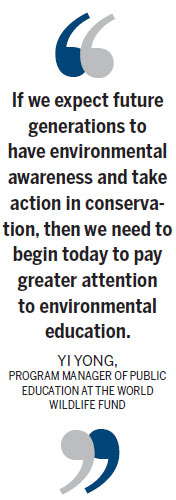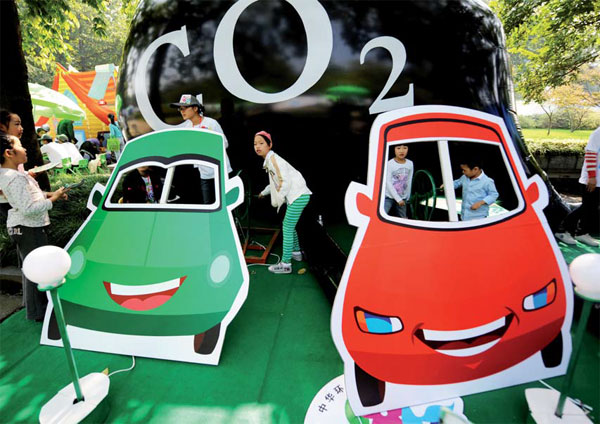Experts: Give children a greener education
Updated: 2015-08-21 08:19
By Zhang Chunyan and Daniel Assab(China Daily Europe)
|
|||||||||||
|
Children in Hangzhou take part in an environmental awareness activity to learn about the dangers of greenhouse gas emissions. Provided to China Daily |
As greenhouse gases build up in the Earth's atmosphere, the planet is getting warmer. Extreme weather conditions, drought and rising sea levels are already affecting the environment and people's livelihoods.
People worldwide contribute to climate change every day. Experts all point out that it is important to educate children to know about climate change and let them know how to reduce carbon emissions in daily life.
Kenny Webster, head of learning operations at London's Science Museum, believes there are two main reasons why

teaching children about climate change is so important.
"The first is that the true impact of climate disruption is going to affect our children and our grandchildren. It is vital that they are informed of the reasons and mechanisms that have led to mankind developing the situation in the first place," he says.
"The second is that it is most likely that it will be our children who find the solutions to living with or reversing the effects of climate disruption that we have created for them."
Webster also notes that in the UK there are fewer children choosing to study science, technology, engineering and math subjects at university, and this is creating a skills gap.
"While it is indeed a global problem, each country must do its part toward finding a solution."
In China, although environmental education is now part of the curriculum and interest in the subject is growing, more needs to be done to fully engage children in the environmental issues they will inherit.
The World Wide Fund for Nature is the world's largest conservation organization and was the first international conservation organization invited to work in China. Yi Yong, program manager of public education at the WWF, believes China's environmental issues are now going through the toughest stage.
"If we expect future generations to have environmental awareness and take action in conservation, then we need to begin today to pay greater attention to environmental education," he says.
Yi says environmental education needs to be tailored for the age of the child: "In nursery and early primary schools years, environmental education can simply be observation of nature. In later primary school years analytical thought can be introduced to prepare students in secondary school to face greater problems and seek methods to solve them.
"These methods should emphasize teaching out of the classroom and practice in society, rather than conventional methods of teaching. But in China today the collaboration between formal and informal education is limited," Yi says.
"Most are confined to formal education in the environment, and only explore the topic once or twice a term. Some creative projects encourage students to use science and technology to solve environmental problems, such as water conservation and clean energy use, but concern about real environmental issues is still relatively small."
Yi believes more needs to be done in China to teach children about the environment. "A real system of environmental education still needs to be strengthened. Environmental education needs to be more interactive, heuristic and exploratory, as well as more often take place outside the classroom.
"Environmental education should also be relevant to the students' lives, learning what is happening in today's society and exploring the root causes of these problems. Solutions should not be seen as limited to technology. Instead, children should be encouraged to use communal and management methods to tackle these problems, such as research, debate and realizing mutual interests. The learning process is often more important than the outcome," Yi says.
In the United Kingdom, environmental education is finding its place in the school curriculum, and many are taking it a step further to give children a greater opportunity to learn about the environmental issues that affect today's world.
Today's Top News
Tsipras resigns, asking snap general elections
Preparations shutter Forbidden City, other major tourist spots
Changing face of illegal immigration
President Xi Jinping calls for crews not to ease up
Jon Bon Jovi sings in Mandarin for Chinese Valentine's Day
DPRK deploys more fire units to frontlines with ROK
No cyanide detected from Tianjin river section with fish deaths
Greek PM to resign, seek snap election in September
Hot Topics
Lunar probe , China growth forecasts, Emission rules get tougher, China seen through 'colored lens', International board,
Editor's Picks

|

|

|

|

|

|







